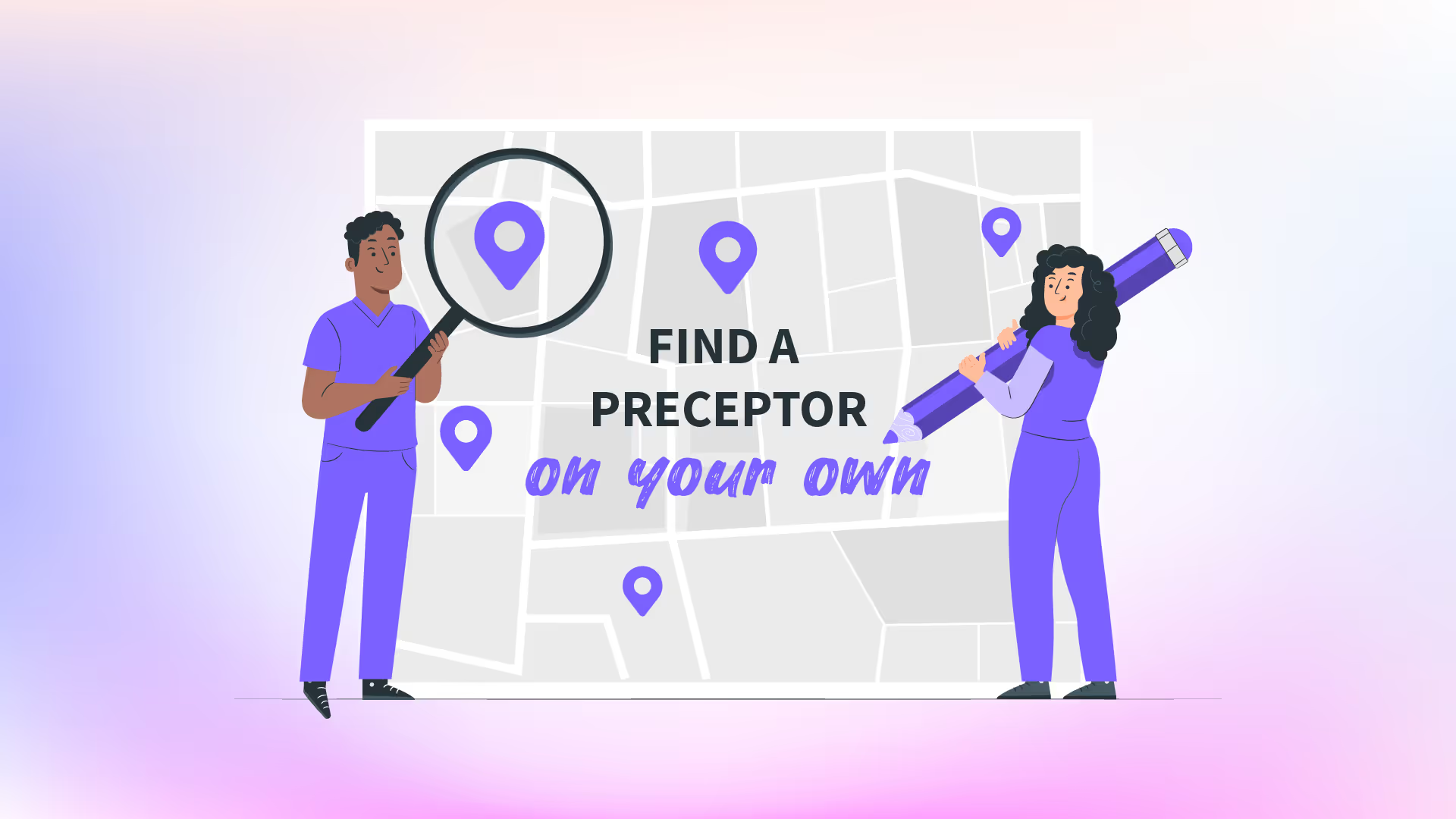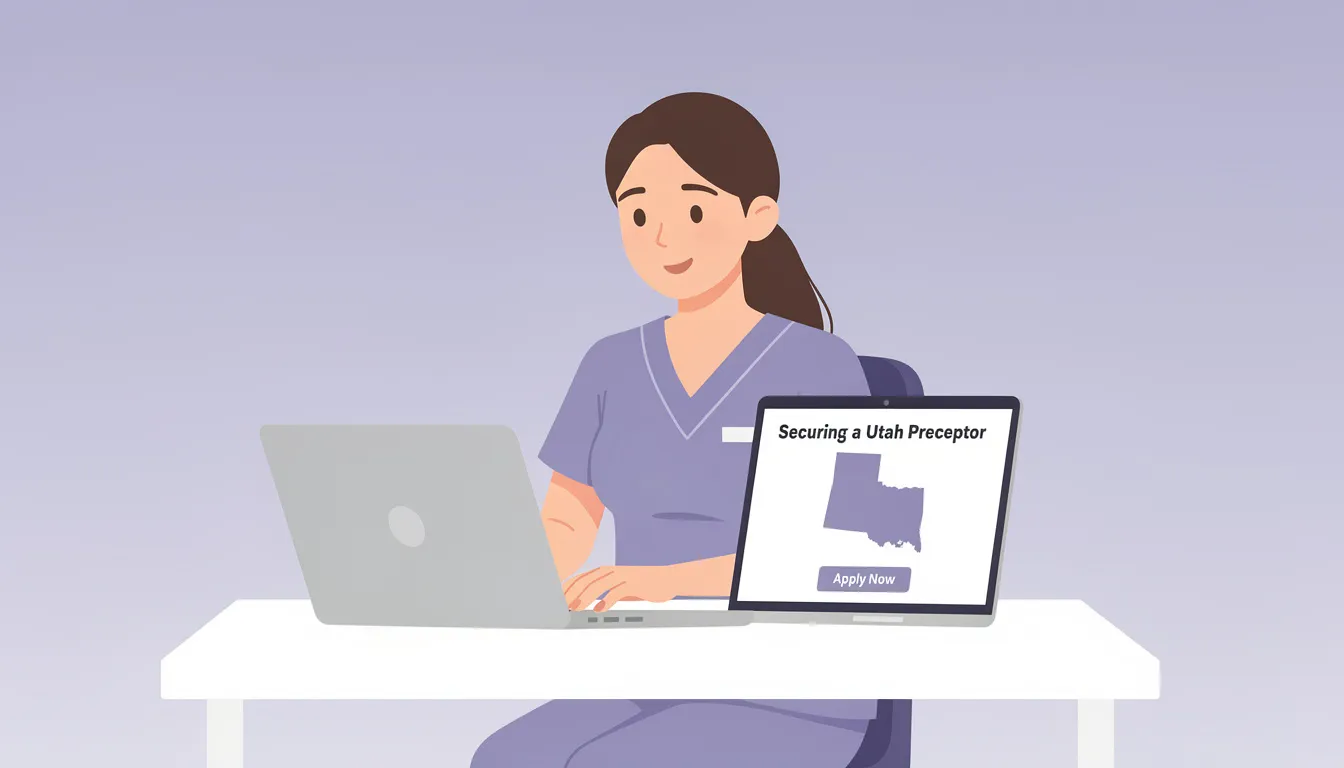If you're reading this, it means you have to find a preceptor ASAP, and you're starting to feel that familiar knot in your stomach that comes with realizing your NP program isn't going to hand you a preceptor on a silver platter. You're not alone – and more importantly, you're absolutely capable of finding the right preceptor for your clinical rotations.
The reality that most nurse practitioner students face:
- Limited school support for securing clinical placements
- Practicum coordinators who provide lists but leave the actual outreach to you
- The challenge of connecting with healthcare professionals while juggling coursework and work schedules
But here's what we want you to know: learning how to find a preceptor independently isn't just a necessity – it's a valuable professional skill. The networking abilities and persistence you develop will make you a stronger nurse practitioner and help you build lasting relationships with healthcare providers.
This article is designed for nurse practitioner students ready to take charge of their clinical experience. Whether you need a preceptor in primary care, women's health, pediatrics, or acute care, we'll walk you through proven strategies that have helped thousands of NP students find experienced preceptors who provide meaningful guidance.
What to expect from your preceptor search:
- The process typically takes weeks to months and requires genuine persistence
- You'll likely face some rejections or encounter sites not currently accepting students
- Success comes from professional communication and leveraging your nursing experience
- Quality clinical placements that create fulfilling clinical experiences are absolutely achievable
Need faster results? This guide contains proven strategies that work, but if you're working against tight deadlines or want professional support alongside your independent efforts, NPHub offers personalized matching services to help secure your clinical placement.
Let's dive into exactly how to make your preceptor search successful.
Understanding Your Preceptor Needs
Before you begin your preceptor search, it's crucial to understand exactly what you're looking for. Not all healthcare professionals make effective preceptors, and finding the right match can make the difference between a fulfilling clinical experience and a stressful rotation.
What Makes a Quality Clinical Preceptor
Essential preceptor qualifications include:
- Advanced practice certification in their specialty area
- Minimum years of clinical experience (typically 1-2 years post-graduation)
- Current licensure and good standing with regulatory boards
- Willingness to dedicate time to mentoring and provide meaningful guidance
The most effective preceptors possess strong communication skills, reflective abilities, and genuine motivation to teach. Research shows that experienced preceptors who demonstrate perceptiveness, responsibility, and professional initiative create the most successful learning environments for nurse practitioner students.
Types of Clinical Sites to Consider
Primary care settings offer comprehensive patient management experience, while family practice environments provide exposure to diverse age groups and conditions. Acute care and urgent care settings develop your critical thinking skills in fast-paced environments.
Specialized areas like women's health, pediatrics, and other focused practices allow deep dives into specific patient populations. When evaluating numerous clinical sites, consider whether a focused practicum site approach or variety across multiple locations better serves your learning objectives.
Essential Strategies for Your Independent Preceptor Search
Success in finding the right preceptor comes down to three core approaches: leveraging existing connections, making direct contact with potential preceptors, and utilizing digital platforms strategically. Each method requires different skills but can yield excellent results when executed professionally.
Building Your Professional Network
Your nursing experience is your greatest asset. The healthcare professionals you've worked with already know your clinical skills and work ethic, making them ideal starting points for your preceptor search.
Key networking strategies:
- Reach out to colleagues, supervisors, nurse practitioners, or physicians from your RN career
- Contact former students and program alumni through your practicum coordinator
- Join professional organizations like the American Association of Nurse Practitioners (AANP)
- Attend local conferences, seminars, and community health events
Former students represent an often-overlooked goldmine of connections. Alumni understand your program's clinical requirements and can provide insights about local preceptors who work well with students from your school.
Direct Outreach Techniques
Cold calling strategies that work require preparation and timing. Research practices beforehand, call during less busy hours (typically mid-morning or mid-afternoon), and prepare a clear, concise introduction emphasizing your nursing experience and scheduling flexibility.
Effective direct approaches include:
- In-person visits during slower periods with professional attire and introduction letters
- Phone calls with prepared talking points about your clinical requirements
- Working closely with your practicum coordinator for leads and referrals
- Following up respectfully on initial contacts
- Reaching out to office managers directly
In-person visits can be incredibly effective when done respectfully, allowing potential preceptors to put a face to your name and see your professionalism firsthand.
Digital and Social Media Approaches
Professional networking platforms like LinkedIn help you search for nurse practitioners in your specialty and geographic area. Join NP-focused groups and participate in discussions to build visibility within the professional community.
Online search methods:
- LinkedIn professional networking and specialty groups
- State nursing board directories and healthcare facility websites
- NP-specific forums and discussion boards
- Social media groups dedicated to nurse practitioner students
These digital platforms help you identify potential preceptors and gather information about their practices before making initial contact.
Comprehensive Resource Hub: Step-by-Step Guides
Your complete toolkit for finding preceptors through every channel:
- How to use Social Media to find Preceptors
- How to find preceptors at networking events
- How to Find Nurse Practitioner Preceptors Using Facebook (2025 Edition)
- How to find nurse practitioner preceptors using Twitter (Now X, 2025 Edition)
- How to find a preceptor: 4 quick ways to get started
- How to Find a Preceptor Using LinkedIn (2025 Edition)
- NP Students: How to find Free Preceptors?
- How to find an NP Preceptor near me?
- Nurse Practitioner clinical sites: Finding the right preceptor
- How to Find a Preceptor: Essential Tips for Nurse Practitioner Students
- Awesome Pro-Tips to Get Your Own Clinical Rotations
When DIY Isn't Enough: Recognizing the Limits
Despite your best efforts, finding preceptors independently can hit roadblocks that aren't about your qualifications or approach — they're about market realities and time constraints that affect every nurse practitioner student.
Common Challenges NP Students Face
Time constraints create the biggest hurdle. Balancing work schedules, coursework, and family responsibilities while conducting a thorough preceptor search often proves overwhelming. Many healthcare providers are also inundated with requests from students, leading to slower response times or no responses at all.
Additional challenges include:
- High rejection rates due to preceptor availability issues and scheduling conflicts
- Geographic limitations in areas with fewer healthcare providers
- The mounting stress of approaching clinical deadlines
Signs It's Time to Consider Professional Help
When weeks of independent searching yield minimal results, or when you're facing tight program deadlines, preceptor matching services can provide personalized matching processes that save valuable time. These services offer experienced guidance in your preceptor search, leveraging established networks and relationships you might not have access to independently.
Professional matching services understand both the needs of students and the preferences of preceptors, streamlining what can otherwise be a lengthy and stressful process.
Ready for professional support? NPHub specializes in connecting NP students with qualified preceptors who match your program requirements and specialty interests. Explore our matching services to secure your clinical placement efficiently.
Frequently Asked Questions
How long does it typically take to find a preceptor on your own?
The preceptor search process typically takes 4-8 weeks when done independently, though this varies significantly based on your specialty, location, and availability. Nurse practitioner students in high-demand specialties like women's health or pediatrics may need additional time, while those seeking primary care or family practice placements often find options more quickly. The key is starting your search well before your clinical rotation begins and maintaining consistent outreach efforts.
What should I do if potential preceptors aren't responding to my outreach?
Many healthcare professionals receive numerous requests from NP students, so lack of response doesn't reflect on your qualifications. Try diversifying your approach: if you've been emailing, switch to phone calls or in-person visits. Contact office managers directly, as they often handle scheduling decisions. Consider expanding your geographic search radius or exploring non-traditional clinical sites like urgent care centers or specialty practices that may have more availability.
Can I use preceptors from different specialties for my clinical hours?
This depends entirely on your NP program requirements. Most programs specify minimum clinical hours needed in particular specialties - for example, you might need specific hours in acute care, primary care, and your chosen specialty focus. Check with your practicum coordinator about whether rotations can span multiple specialties or if each clinical placement must align with specific program requirements.
How do I know if a potential preceptor meets my program's qualifications?
Before approaching any healthcare provider, verify they meet your program's preceptor qualifications. Most programs require preceptors to be licensed nurse practitioners, physician assistants, or physicians with a minimum amount of post-graduation experience (typically 1-2 years). They should also practice in a setting that provides appropriate patient care experiences for your learning objectives. Always confirm these details with your practicum coordinator before finalizing any clinical match.
What's the difference between finding preceptors myself versus using a matching service?
Independent preceptor searching gives you complete control over the process but requires significant time investment for networking, cold calling, and managing communications. Preceptor matching services like NPHub handle the search process for you, leveraging established professional networks and relationships with healthcare providers who regularly accept students. While DIY searching can work well for students with strong professional connections and ample time, matching services offer personalized matching processes that can expedite placement, especially when facing tight deadlines.
Find a preceptor who cares with NPHub
Book a rotation.webp)








.webp)


.webp)



%20(3)%20(2).svg)
.webp)